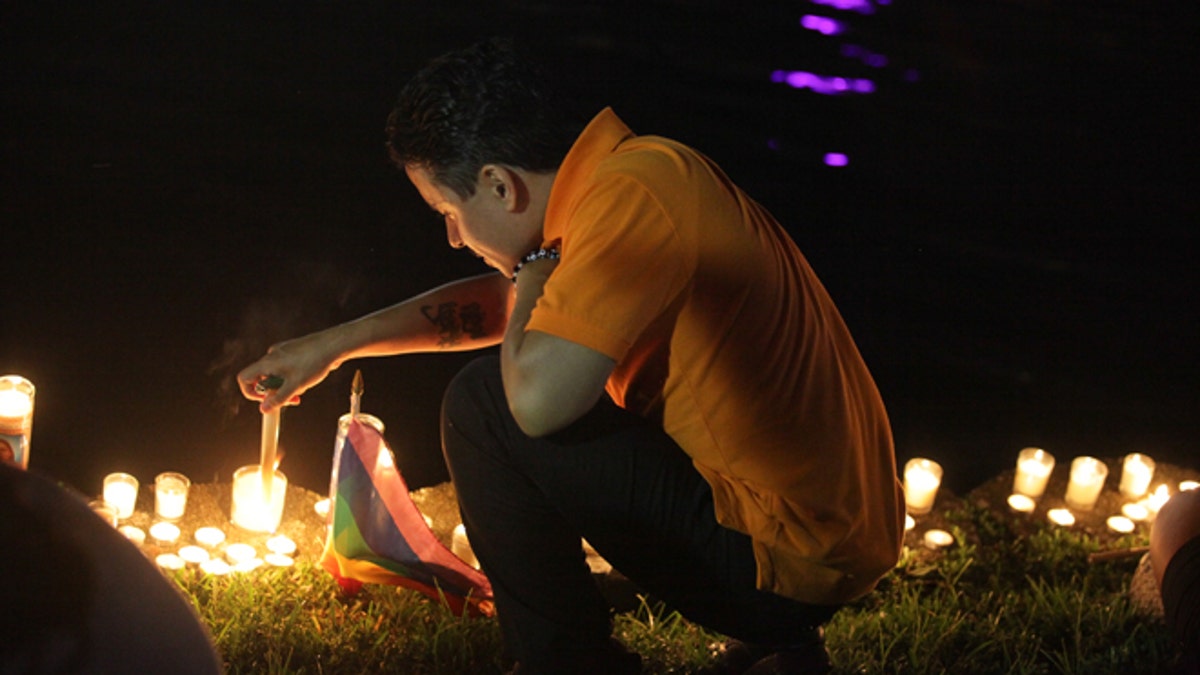
A mourner in Lake Eola Park lights a candle in memorium of the Pulse nightclub shooting victims.
At every mention of the Orlando LGBTQ massacre I choke up; my emotions range from anger to fear and sadness. For a while I feel inconsolable.
I also felt that way on June 16, 1976 when black schoolchildren in Soweto, South Africa, were gunned down by the police and military of their own country as they engaged in a peaceful protest.
Then as now the senseless atrocity and bloodshed may have some redemptive quality. The trauma of Orlando and Soweto can never be erased but we may choose to be redeemed by them.
Every terrorist act like the one in Orlando causes many of us to reflect on our place within the human family. Our own sexuality, spirituality, religion, gender, family of origin and love of country inform that story which reveals our uniqueness and membership in the human family. Beyond the cheap grace of labeling one another, the choice of where to place yourself on the human landscape is where redemption is welcomed or not.
I was born in South Arica to a father of proud British and Scottish heritage and a mother whose lineage was Palestinian, Russian and British.
I did not recognize it at the time, but our family spread across the world made me aware that we were part of something bigger than our own nuclear unit.
I am also a gay man and after being sent to the United States to avoid imprisonment in South Africa for refusing to serve in a military that murdered its own people I became an undocumented person; a so-called “illegal” human being. To some I was a double illegal – gay and undocumented.
I am also ordained in the Episcopal Church even though my work is now beyond the borders of institutional religion. I’ve been blessed to work with remarkable Americans who are Buddhist, Hindu, Sikh, Jewish, Christian, Muslim, Native American among others.
An indelible mark has been left on my understanding of life by the generous, welcoming hospitality that so many Americans offered me when I arrived in this country and I’ve been a proud citizen of the United States of America for two decades.
Like most of us I am shaped and formed by many influences. Like most people one or two labels do not begin to describe who I really am. So where are the openings for redemption to be found?
It begins by uttering the truth that this massacre intentionally targeted people who are lesbian, gay, bisexual or transgendered. To speak that truth is both liberating and illuminating. It is also important to name the truth that the terrorist targeted Puerto Rican and Latino people. And yes he wrapped his act of terror in the mantle of Islam.
Images of thirteen year old Hector Pieterson, the first of the Soweto students to be gunned down in the streets flashed across the world long before the advent of social media. They were murdered because they were black children and youths. Those who killed them acted on behalf of a government who claimed that the Christian and Jewish scriptures blessed their violent policies designed to enshrine a theology claiming that black people were less human than others.
The numbing tragedy of that day laid bare the truth that hatred, violence and death dressed up in religious language has no future. Apartheid and those who supported it around the world – explicitly or implicitly -- were revealed to be morally bankrupt. The tragic blood of children shifted the human consciousness. Suddenly young people on college campuses in South Africa, the United States and elsewhere joined newly charged movement to end apartheid and replace it with a free and democratic country. They were joined by Muslim, Jewish and Christian leaders within South Africa and around the globe who said every human life was of inestimable value.
The redemptive moment was to say “No more.” For in declaring that something is wrong and intolerable you have to declare what you would like to help create.
So what does it mean to say that no human life is disposable, unimportant or unwanted? How does the terror unleashed by the Orlando killer open a space for redemption?
It might mean reading aloud the name of each person killed in Orlando remembering that they could be your son, daughter, niece, nephew, cousin, co-worker, neighbor, fellow congregant, mom or dad. It might mean asking how you would console a real or imagined friend whose loved one was killed because they are part of the LGBTQ community or because they are Puerto Rican or Latino – or just because they’re American. Or perhaps just because they are human as we are.
Redemption may be discovered in refusing to live with labels that diminish or claim that an entire religion is culpable. It may be discovered in attending that community project that members of a church, synagogue and mosque are collaborating on.
Redemptive moments emerge when we are awakened to a truth that is larger than us, a truth that makes us remember we are part of a larger human family than we imagined, a connection to one another that transcends any religious orthodoxy. Redemption always lies beyond our own self. Some would say in the generosity of a God.
So which side of the human and spiritual equation do you and I want to live on? Do we want to say that a human life is disposable because of sexuality, religion, race, gender, national origin or any other factor? I do not wish to live on that impoverished and sinister plane.
I choose stand with you and all affected by the massacres of the Sowetos and Orlandos of the world because only together can we each help to create a safer world where we name and celebrate our differences and our profound need for one another. That is redemptive.
